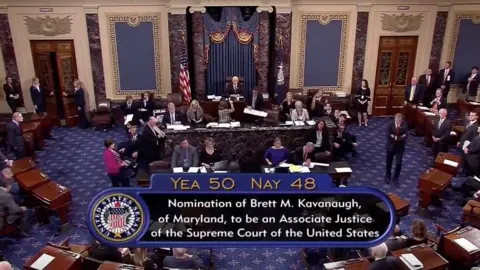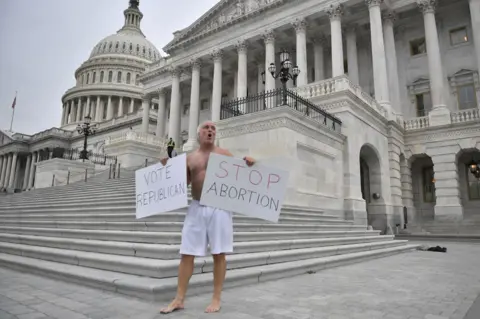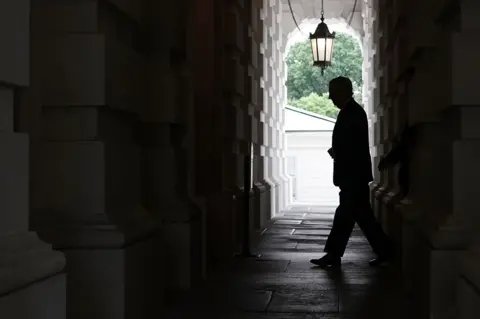Kavanaugh vote: The political fallout from the Supreme Court battle
 Reuters
ReutersThe Republican Party finally got the votes to confirm Brett Kavanaugh to the Supreme Court. Although that battle is over, the political war is just beginning.
Donald Trump's court pick generated a controversy that captured the nation's attention in a way that few political issues do. It generated daily headlines rivalled only by the US quadrennial presidential elections.
Now that the bombs have been thrown, it's time to assess the fallout.
A Republican base engaged?
For most of this year, key indicators have pointed toward a strong Democratic showing in November's mid-term elections. Left-leaning voters, thanks to their anger at the president's policies and rhetorical proclivities, appear to be champing at the bit to have their say at the ballot box.
They've been flooding Democratic candidates with political donations. They turned out in record numbers to vote in primaries and special elections across the nation. They're eager, after two years, to take action to wash away the bitterness of the 2016 presidential defeat.
Republicans, on the other hand, have seemed less motivated. It's a natural consequence of winning. Those in power, even in good times, can grow complacent.
Mr Trump and his team have sought to rally their conservative base in the face of this Democratic onslaught. In February, a White House adviser told Axios that the president was searching for "unexpected cultural flashpoints - like the NFL and kneeling - that he can latch onto in person and on Twitter".
In the Kavanaugh fight, and the suggestion that men - fathers, brothers, sons - are at risk of being falsely accused of sexual misconduct, the president may have found his magic bullet.
So far, however, all the non-anecdotal evidence for this resides in one recent poll showing the "enthusiasm gap" between Democrats and Republicans that had been a chasm as recently as July had become a statistically non-existent.
 Getty Images
Getty ImagesIn July, according to the Marist/NPR poll, 68% of Republicans said the November mid-terms were "very important". In October, the number had climbed to 80%, rivalling the Democrats' 82% mark.
The poll also showed that the margin by which the public preferred a Democratic-controlled Congress over a Republican one had shrunk from 12 points in September to six points.
The survey has set off a predictable panic among Democrats and probably was part of the reason Mr Trump tweeted on Wednesday about "such enthusiasm and energy" for Mr Kavanaugh.
"Look at the Energy, look at the Polls," he wrote. "Something very big is happening."
It's just one poll. But it has given Republicans a feeling they've missed for quite some time. Hope.

Peaking too soon?
There's been an open question over the last few weeks about what would be better for the Republican Party's mid-term prospects. Conservative advocates warned that if Mr Kavanaugh's nomination crashed, conservative voters would punish the party by staying home on election day.
Democrats, on the other hand, feared that an open Supreme Court seat on election day would be extra motivation for Republicans - particularly in the 10 states Trump won in 2016 where incumbent Democratic senators are seeking re-election.
At the last presidential election, Republicans stuck by Donald Trump through the ups and downs of the campaign, and he won a larger share of evangelical voters than Mitt Romney did in 2012. The open Supreme Court seat was a big reason why. There were more than a few Democrats who were concerned that a similar trend would replay itself in the coming weeks.
Now, however, the court battle is in the rear-view mirror. In recent mid-term elections, voters have tended to be more motivated by opposition - anger at the other party's actions - than an interest in rewarding their own side's good deeds.
Perhaps that will change this time around. But, in politics - particularly in the Trump era - a month is an eternity.

Mitch McConnell, back on top
One thing that is certain is that it hasn't been easy being Senate Majority Leader Mitch McConnell. One of his predecessors, Trent Lott, once compared leading Republicans in the chamber to herding cats.
In 2016, Mr McConnell was a regular punching bag for Republican presidential hopefuls who viewed his job performance as too timid or insufficiently canny. In 2017 Alabama Senate candidate Roy Moore won the Republican nomination by voicing his opposition to Mr McConnell as the face of the Republican Washington establishment.
 Getty Images
Getty ImagesEarlier this year West Virginia coal tycoon Don Blankenship aired television advertisements mocking Mr McConnell as a Washington "swamp captain" who "created millions of jobs for Chinapeople" as part of his unsuccessful bid for the Republican Senate nomination.
After the Kavanaugh confirmation, however, it appears Mr McConnell has renewed standing among his party's grass-roots base.
Blankenship had alleged that Mr McConnell had secret ties to drug traffickers and came up with the nickname "Cocaine Mitch". That moniker has now been adopted by Mr McConnell's supporters, including former critics, as a way of celebrating the Kentucky senator's bare-knuckle Senate leadership.
If Republicans do hold on to their Senate majority in November, Mr McConnell's herd of cats might be a lot easier to manage in the new year.
